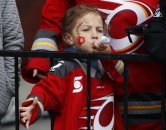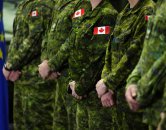The Yukon Liberals Are Coming Apart at the Worst Possible Time
On May 12, Doris Bill stood before a small crowd to launch her campaign for the Yukon Liberal Party leadership. A former CBC journalist, three-term Kwanlin Dün First Nation chief, and residential school survivor, she made her bid at a time when Yukoners were disillusioned with the party. The Liberals, in power since 2016, have seen two premiers quit for personal reasons since the last election; the latest, Ranj Pillai, left a vacancy Bill was now vying to fill. “With me stepping in the race, people are telling me it’s rejuvenating the party,” Bill told the CBC. If successful, she would become the Yukon’s first Indigenous premier—and the first born in the territory.
Two weeks later, Whitehorse businessman Mike Pemberton announced he was also seeking the leadership. Bill’s high profile and political experience made her the clear frontrunner, but Pemberton—active in the party for about twenty years—argued that it was important that there was a contest. For the past two decades in the Yukon, every Liberal leader has been acclaimed.
Then, the unexpected happened. At the convention in June, Pemberton came out on top—by thirteen votes. A CBC reporter asked him if he had actually intended to win. “Of course,” he said.
Things got weirder. In the weeks after, five of eight Liberal members of the legislative assembly announced they weren’t seeking another term in the fall. (Two others, former premiers Pillai and Sandy Silver, had already said they wouldn’t run again.) Bill says long-time Liberals have told her they’re not voting for the party. When I started reporting this story in late August, the Liberals had announced just one candidate compared to the Yukon Party’s eighteen and the New Democratic Party’s nine. The Yukon has twenty-one ridings.
This election, which will be held on November 3, is one to watch. It could be the last under the first-past-the-post system; Yukoners will vote in a plebiscite on whether to transition to a ranked ballot. It’s also the first election with new riding boundaries, a controversial move that prompted argument over rural–urban representation.
It seems clear the Liberals will fall. By what margin will come down to enthusiasm. With our population of about 46,000 people, elections can be decided by the slimmest tally. “The small number of voters in each riding makes the campaign and the voter turnout incredibly important,” says local newspaper columnist Keith Halliday. It’s striking, then, that the Liberals have pinned their fortunes on a former furniture-store owner with little name recognition.
It’s a critical time for the Yukon. The territory’s population continues to grow as we contend with health care staffing shortages, the high cost of housing, increasing demand for electricity, and rising property crime. The new government will be responsible for revamping the Yukon’s outdated mining legislation and handling the fallout from last year’s environmental disaster at the Eagle Gold Mine. It feels like an especially important time for voters to be considering: What kind of Yukon do we want to live in, and which party will get us there?
In this climate, the two candidates began campaigning. Pemberton, who called himself “right of centre,” said he wanted to improve community safety and help businesses be more profitable. “I am committed to helping people,” he told the CBC.
Bill pointed to her experience in residential school and foster care as an example of her unique perspective. During her tenure as chief of her self-governing First Nation in Whitehorse, she often worked closely with the municipal and territorial governments. “If you look at all past premiers, there’s no one with the kind of background that I have,” she told the CBC.
They each signed up hundreds of members to the Yukon Liberal Party. To join, you must be a Yukon resident and at least fourteen years of age. As the convention neared, both candidates received the eligible voter list, as per party rules. When Bill read through the list, she says, about eighty names had no addresses and had phone numbers with non-Yukon area codes. She filed a challenge and the party’s credentials committee investigated, logging the missing addresses and confirming residents.
Then Pemberton won by a hair. Bill was angry. She says she received dozens of messages from Yukoners upset that their vision for the territory, with a female First Nations leader, wouldn’t come to be. Supporters also told Bill they felt the decision hadn’t been made by Yukoners. This boils down to the belief that, during his campaign, Pemberton signed up many recent immigrants. As a private sector employer, he often hired staff via the Yukon Nominee Program, through which foreign and out-of-territory workers can immigrate to the Yukon. But in recruiting members, Pemberton says, he didn’t target people associated with the Yukon Nominee Program—he focused on everyone he knew.
Still, none of this violated party rules. There’s no minimum time period one has to live in the territory to be eligible to vote in a Liberal leadership convention, though you must show proof that you live here. The drawback to signing up members who aren’t Canadian citizens, though, is that they can’t vote in general elections.
This identity question reflects an awkward push-pull in the Yukon between the influx of new residents—both from other parts of Canada and abroad—and long-time locals. Some born-and-raised Yukoners, known colloquially as BNRs, express disdain for new residents, a don’t-come-here-and-tell-us-how-to-do-things mentality. The irony, of course, is that everyone was a settler here at some point—except First Nations, who’ve endured waves of newcomers arriving in the territory and shutting them out of decision making.
Bill isn’t interested in defining what makes someone a Yukoner, though she does value the opinion of “people who are long-term residents, who have invested in the community, who know the issues, and know the people.” When her team contacted some of the members Pemberton had signed up, they said they were voting for him because he was a nice guy, or he’d helped them come to the Yukon. That bothered her—that it wasn’t about what his values were.
Matthew Lien is a lifelong Yukoner who had never joined a political party until he signed up to vote for Bill. He thought her leadership could represent a “sea-change moment”—an updated era for the territory. He was stunned she lost. “It instilled in me a deep concern that there was an old guard at the core of the party who just would not allow this kind of change,” he says.
At the convention, Lien heard a man proudly recounting how, when a woman tried to join the Yukon Order of Pioneers, the fraternal order took the matter to the Supreme Court and won. Bill says, during her campaign, she occasionally heard comments second-hand about some party members not wanting an Indigenous woman at the helm. It’s hard to know how much this factored into her loss.
After Pemberton won, Bill says, he asked her to run on his team. She declined. During her bid, there was much talk about what was “for the good of the party.” She says she’s tired of it. “Right now, I’m doing everything for the good of Doris Bill.”
Lien soon found his own faith in the party unravelling. In the two months after the convention, he reached out to the Liberals multiple times, asking for the party’s constitution and convention rules. He wanted to know more about the party he’d joined. But he never got a response. He sent a final email to terminate his membership. (He recently announced he’s running for the Yukon NDP.) To him, the lack of response suggested a crisis within the party. Of the seven departing MLAs, he says: “It feels like really nice, good-hearted mountain goats leaving a crumbling mountain. I don’t want to say rats leaving a sinking ship. That’s just not nice.”
But the Yukon Liberal Party disputes any suggestion that it’s flailing, or that Pemberton’s win divided members, or that the MLAs who’ve decided not to run again did so because of Pemberton. “That’s mostly horseshit,” says president Jason Cunning. “There are some people mad that Doris Bill didn’t win, and that’s usually the case when you support a candidate and they don’t win.” Leadership races come down to who signs up more people and gets them out to vote, he says. It’s that simple.
Horseshit or not, it’s not looking good for the Liberals. Pemberton isn’t attending two debates this week, hosted by the Yukon First Nation Chamber of Commerce and the Council of Yukon First Nations (CYFN) respectively, though the leaders of the NDP and the Yukon Party will be at both. In his place, the Liberals are sending other candidates. “We’re eager to showcase the strength of our entire team—they’re all leaders,” the party wrote in an email.
Pemberton’s absence from the debates comes amid lingering fallout from comments he made to First Nations leaders over the summer. During the CYFN general assembly in June, Pemberton said that he doesn’t see colour, and that it makes no difference to him if someone is red, yellow, or white. “While his intent was to emphasize inclusivity and fairness as core values,” said the Yukon Liberals in a statement to The Walrus, “his choice of words in the analogy was inappropriate and wrong.”
When I spoke with him a month ago, Pemberton was still trying to line up candidates. “When your party loses 90 percent of the political team and you have to rebuild in the short period of time that we have, yes, it’s difficult,” he acknowledges. “But I knew this was going to be challenging.” A month out from the election, he has five holes to fill on his team.
And while he works to shore up the party, he’s had to game out his own chances. Pemberton will be running in Whitehorse West, next door to his home riding of Copperbelt North. The choice seems strategic: Copperbelt North is held by Yukon Party leader Currie Dixon, a popular MLA, while Whitehorse West is currently a Liberal seat and likely an easier win. Meanwhile, Bill has been courted by both the NDP and the Yukon Party, but she’s decided to stay out of the fray.
Yet behind these tactical moves lies a counterfactual: What if Bill had won? Would the Liberals’ fortunes have looked different? Could her leadership have persuaded Yukoners to give the party one more chance? In the Yukon’s history, only once has a governing party won three consecutive terms, and only once has one fallen to third place—the Liberals in 2002. The party now sits at the edge of both thresholds at once, poised either to make history or repeat it.
The post The Yukon Liberals Are Coming Apart at the Worst Possible Time first appeared on The Walrus.



Comments
Be the first to comment